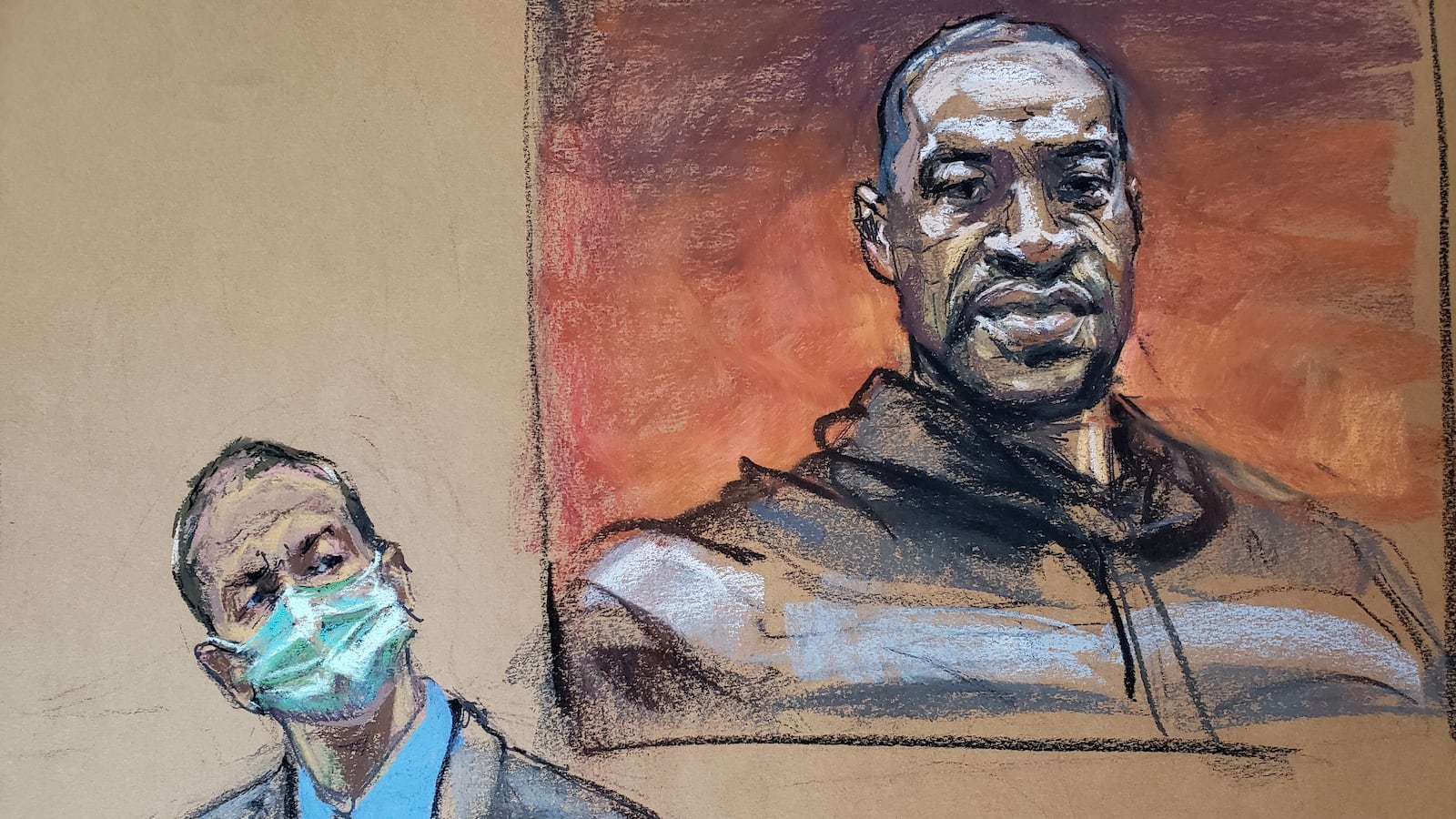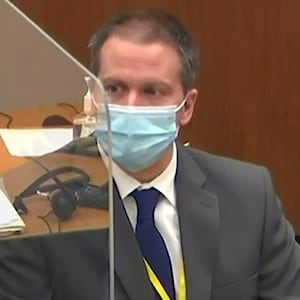As Derek Chauvin’s murder trial comes to a close, both sides made their closing arguments on Monday, with prosecutors insisting the former Minneapolis cop’s fatal arrest of George Floyd wasn’t “policing” but “murder”—as his defense claimed he used “reasonable” force.
Prosecutors on Monday detailed to jurors in Hennepin County court how Chauvin’s decision to press his knee into the 46-year-old Black man’s neck while he repeated that he could not breathe was unjustifiable and inhumane.
“The truth of the matter is that the reason that George Floyd is dead is that Mr. Chauvin’s heart was too small,” special prosecutor Jerry Blackwell said Monday just before the case was sent to the 12-member jury.
Prosecutor Steve Schleicher also insisted the officer “knew better; he just didn’t do better” during Floyd’s May 25 arrest over a fake $20 bill. “What [Chauvin] did is not policing. What [Chauvin] did is assault.”
“That day, his badge wasn’t in the right place. He’s not on trial for who he was. He’s on trial for what he did,” Schleicher argued, adding that Chauvin “chose pride over policing.”
During his closing argument—which lasted 2 hours and 47 minutes—defense attorney Eric Nelson argued that Chauvin was distracted while dealing with the growing anger from bystanders—and failed to notice that Floyd had stopped breathing.
“A reasonable police officer will hear the frustration growing...the increase of the volume of the voices...will hear the name-calling...they’ll take that into their consideration,” Nelson said. “Officers are human beings capable of making mistakes in highly stressful situations.”
“There is absolutely no evidence that Officer Chauvin intentionally, purposefully applied unlawful force,” Nelson claimed.
The closing arguments come after four weeks of testimony in the watershed trial. During the trial, prosecutors have insisted to jurors that Chauvin, 45, “betrayed” his badge when he ignored Floyd’s dozens of pleas for help as he knelt on his neck for a total of “9 minutes and 29 seconds” over a suspected counterfeit $20 bill. During the arrest, Floyd cried out he could not breathe a staggering 27 times before losing consciousness.
Chauvin “heard him and all he did was mock him, [saying] ‘It takes a lot of oxygen to complain,’” Schleicher said.
“George Floyd struggled, desperate to breathe, to make enough room in his chest to breathe. But the force was too much. He was trapped, with the unyielding pavement beneath him, as unyielding as the men who held him down,” Schleicher said. “A grown man, crying out for his mother. A human being.”
Prosecutors called 38 witnesses over 11 days. Among those were five current and former cops—as well as the Minneapolis police chief, who said Chauvin used excessive force in violation of his training and department protocol. Three medical experts concluded Floyd died of low oxygen, or asphyxia, from Chauvin’s actions during the arrest, while several bystanders, family members, and friends of Floyd gave days of emotional testimony.
Schleicher insisted Monday that Floyd’s death “wasn’t a sudden cardiac arrhythmia, a heart attack, a drug overdose, a death from underlying conditions or an accident. It was an intentional act by Chauvin.”
“The government put on a very strong case. I thought that the testimony of the chief and other officers that the force was not authorized or part of [the] training was very effective. It is rare to have testimony from police officers in these cases other than retained experts. The cross of the use-of-force witnesses was largely ineffective,” Jonathan Smith, the executive director of the Washington Lawyers’ Committee for Civil Rights and Urban Affairs, told The Daily Beast.
Chauvin’s defense lawyer, however, argued that his client was simply doing what “he was trained to do throughout his 19-year career,” calling on seven witnesses in two days and focusing heavily on Floyd’s previous health issues and alternative explanations for his death. Chauvin declined to testify on his own defense, invoking his Fifth Amendment right.
On Monday, Nelson compared criminal cases to baking chocolate cookies and emphasized the high standard of reasonable doubt. “Space aliens flew in and inhabited the body of Derek Chauvin and caused this death. That’s fanciful,” Nelson said.
The defense attorney then focused on two key points: The state has to prove beyond a reasonable doubt that Floyd died as a direct result of Chauvin’s actions and the ex-officer must have intentionally harmed him.
“The use of force is an incredibly difficult analysis,” Nelson insisted, urging the jury to look at the totality of the incident and not just the nine minutes that Chauvin held his knee on Floyd’s neck. “You can’t limit it to 9 minutes and 29 seconds, but it started nearly 17 minutes earlier.”
The defense attorney argued that several factors could have contributed to Floyd’s death, including carbon monoxide poisoning from the police squad car or drug overdose.
Smith, a former official in the Department of Justice’s civil-rights division who also led the independent investigation into Elijah McClain’s death at the hands of police in Colorado, said he believed Nelson’s defense was “more effective at trying to create confusion on the cause of death” than anything else.
“The controversy on whether Mr. Floyd had an enlarged heart and about carbon monoxide blood levels should have been avoidable for the prosecution, but it is unclear whether it will matter much in the end,” he said, before noting that conviction in police cases are rare. “Even in light of the very strong case by the state, it remains to be seen what the jury will do.”
The idea of creating confusion in the courtroom also caused late drama in the case when prosecutors slammed the defense’s witnesses who seemed to suggest Floyd could have died from carbon monoxide poisoning.
On Thursday, Martin Tobin, a renowned pulmonologist who testified that Floyd’s airflow was so restricted it was “as if a surgeon had gone in and removed” his lung, was called back to the stand at the last minute to rebut the bizarre idea the squad car’s exhaust contributing to Floyd’s death.
The idea was brought forward by David Fowler, a forensic pathologist, without any data or test results. Tobin’s testimony also came after prosecutors said they got last-minute test results of “blood gas readings” that show Floyd’s carbon monoxide levels were normal.
Andrew Baker, the Hennepin County medical examiner who performed the autopsy on Floyd, also testified for the defense that the 46-year-old died of “cardiopulmonary arrest complicating law-enforcement subdual, restraint, and neck compression” and that heart disease, fentanyl use, and methamphetamine were “other significant conditions.”
“The defense seems to have put most of its marbles in that basket,” said Mike Lawlor, an associate professor at the University of New Haven and a former prosecutor, added about Floyd’s cause of death. He added to The Daily Beast that the defense’s “expert witnesses did not really undermine the state’s case–and “have bolstered it to some extent.”
While the defense seemed focused on sowing doubt, prosecutors leaned heavily on emotional testimony and showing jurors the deep trauma that watching Floyd’s death caused so many people.
“The most moving, and searing part of the trial were the eyewitnesses. Their testimony was compelling and impactful. The trauma that they experienced watching Mr. Floyd be killed and the helplessness they felt in being unable to stop Chauvin came through clearly,” Smith said.
Among the group were an off-duty Minneapolis firefighter and EMT—who said she was ignored after repeatedly offering her assistance—as well as an MMA fighter who tried to explain that Chauvin’s chokehold was cutting off Floyd’s circulation. Several teenagers, and one 9-year-old girl, also testified how they begged the officers to stop as Floyd was “gasping for air.”
“You could see his eyes slowly, you know, rolling back up and in his head, and him having his mouth open, wide open,” MMA fighter Donald Williams, who is heard in the viral video yelling at Chauvin to release Floyd, testified during the trial. Eventually, Williams said, Floyd began to “fade away, like a fish in a bag” before he lost consciousness.
As prosecutors played the viral video to jurors on Monday, Chauvin kept his eyes down at the defense table.
“George Floyd was not a threat to anyone,” Schleicher said Monday while lightly pounding his hand onto the lectern before insisting to jurors that “no courage was shown that day” while Floyd begged for his life in front of strangers. “George Floyd begged until he could speak no more and the defendant continued this assault.”
“No courage was required, all that was required was a little compassion and none was shown on that day,” the prosecutor added.
Throughout the trial, jurors also got a peek into how cracked the thin blue line really is in Minneapolis. In addition to Police Chief Medaria Arradondo’s sharp rebuke of Chauvin’s actions, several current and former police officials all disagreed with the use of force.
“Totally unnecessary. First of all, pulling him down to the ground face-down and putting your knee on a neck for that amount of time is just uncalled for,” Lt. Richard Zimmerman, the longest-serving officer in Chauvin’s old department, testified. “I saw no reason why the officers felt they were in danger. And that’s what they would have to feel to be able to use that kind of force.”
The defense, however, tried to smooth over the clear signal that Chauvin has been abandoned by his former peers, bringing forward former cop Barry Vance Brodd, who insisted the former law enforcer’s knee restraint on Floyd was not a “use of force”—but a “control technique” because it caused him no pain.
Lawlor added that while he believes that the prosecution did an “excellent job,” the defense did poke holes in the theory Chauvin inequitably caused Floyd’s death—but that the matter is now up to the jury. The sequestered jury will now decide whether Chauvin is guilty of second-degree murder, third-degree murder, and second-degree manslaughter.
To do so, the 12-person jury will have to unanimously agree that Chauvin caused Floyd’s death, intentionally intended to commit harm, and acted unreasonably as a police officer by not adhering to the training of the Minneapolis Police Department.
“It’s clear to me that Chauvin expects to be heading to prison at some point. How long he spends there is in the hands of this jury,” Lawlor said, adding that for the defense, “their only hope at this point [is] reasonable doubt.”









